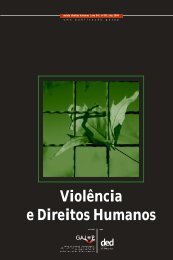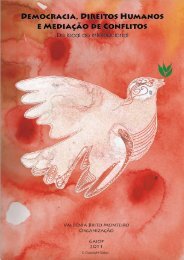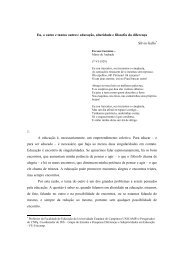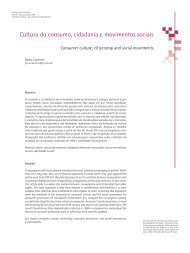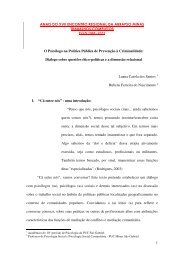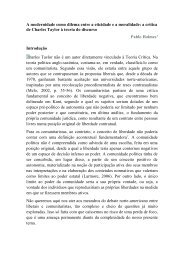16A Brief Overviewof Extrajudicial,Summary or ArbitraryExecutions In Brazil3Extrajudicial, summary or arbitrary executions are not a newphenomenon in Brazil. Since the era in which Portuguese settlers firstoccupied terra Brasilis, five centuries ago, the history of Brazil has beenmarked by such killings. By extrajudicial, summary or arbitrary executionswe refer to homicides committed by security forces (police, militarypersonnel, penitentiary guards, municipal guards, etc.) or others actingwith the color of authority (death squads, for example) in which the victimis not given the opportunity to exercise the right to defense in a legitimatelegal proceeding, or, in the context of a legal proceeding, one which suffersfrom severe shortcomings that undermine its legitimacy.Beginning with the native population in Brazil 500 years ago, ithas been estimated that the violence and diseases inflicted by Portugueseconquistadors, settlers and their offspring have cost the lives of at least one2million indigenous people over the course of the past five centuries.Africans, brought to Brazil by slave traders, suffered similar devastation inthe name of political, cultural and economic domination.In the seventeenth century, various quilombos (communities ofresistance formed on the outskirts of Portuguese/Brazilian settlements byescaped slaves) flourished in Brazil. The most famous of these, Palmares,located in what is now Pernambuco state, was destroyed in a bloodbath.Its leader, Zumbi, managed to escape the destruction but the Portuguesecaught and murdered him two years later; Zumbi's head was placed in apublic square as evidence of his death and a means of intimidating the2. From an original population of between 1,000,000 and 10,000,000 inhabitants, there remain inBrazil today approximately 345,000 indigenous persons, distributed among 215 tribal groups,constituting 0.2% of the nation's population. Source: National Indian Foundation website,www.funai.gov.br/indios/conteudo.htm.
173Afro-Brazilian slave population. The massacre of Palmares, and thekilling of Zumbi are examples of the violence inflicted on slaves in Brazil,which, along with Cuba, were the last American countries to abolish4slavery in 1888.Those who fought for the independence of Brazil from Portugal(among them Tiradentes, Frei Caneca and many others), were also victimsof atrocities including torture and extrajudicial, summary or arbitraryexecutions. At the end of the nineteenth century, the Brazilian governmentordered the military to destroy the entire community of Canudos, one of5the most densely populated cities in the State of Bahia at the time. AntonioVicente Mendes Maciel, better known as Antonio Conselheiro (orAntonio the Counselor), led the Canudos community, which sought to beentirely self-sufficient from the government. Troops destroyed Canudoswith extreme violence: as one historian writes "everything was burned,destroyed decapitated without any distinction among guerrillas, the aged,6women and children."Above all, Afro-Brazilians, indigenous peoples, rural laborers andthe poor in general have been the victims of homicidal massacres in Brazil.The analysis of Paulo Sérgio Pinheiro, professor at the University of SãoPaulo and United Nations Special Rapporteur, in the case of torture is3. "O Quilombo dos Palmares," in História do Brasil (São Paulo: Folha de S. Paulo) 80.4. On the extremely violent punishments inflicted on African slaves in Brazil, "The first escapeattempt would be punished by branding with a hot iron the letter "F" [for "fuga" or escaape] on theslave's face or shoulder. The second attempt would be punished by cutting off one of the slave's ears. Thethird attempt would be punished by whipping the slave until dead. Other "serious offenses," inaddition to attempted escape, would be punished by castration, the breaking of teeth with a hammer,the amputation of breasts, the gouging out of eyes. There were cases of slaves being burned alive ortossed into grinding machines, in addition to those covered in honey and then thrown into antcolonies. Ibid., 76.5. Roland Corbisier,Raízes da Violência: Civilização Brasileira, 1991, 72.6. Regarding the massacre at Canudos: "In his travels [Antonio Conselheiro) recruited anincreasing number of followers, principally among the poor and less fortunate. Carrying a smallprayer bood with the image of Christ, Conselheiro entered into cities and towns singing and prayingwith his followers. He believed that only religion, only preaching would permit him to mobilize therural poor against large landowners and the exploitation of rural laborers . . . . He did not limithimself, however, to sermos. In the cities and towns that he entered, he would organize masses toconstruct buildings of public use, such as schools, hospitals, chapels . . . All goods were of common use, aswas land, grazing areas, crops and animals. Property was limited to personal belongings, one's homeand furniture. Ibid., 65-76.
- Page 1 and 2: Extrajudicial, Summary or Arbitrary
- Page 3: In memory of all the victims ofextr
- Page 6 and 7: PART TWO1. Cases of Extrajudicial,
- Page 9: 91IntroductionINTRODUCTIONThe prese
- Page 12 and 13: 12Executive Summary2Homicide has re
- Page 14 and 15: 14overall, in cases with indicia of
- Page 18 and 19: 18equally valid in the case of extr
- Page 20 and 21: 20With the gradual transition from
- Page 22 and 23: 22carry out land reform.This practi
- Page 24 and 25: 24extrajudicial, summary or arbitra
- Page 26 and 27: 26Next, we analyze a subset of thes
- Page 28 and 29: 28At the same time, the public inte
- Page 30 and 31: 30dia-reported cases is registered
- Page 32 and 33: 32Of these media-reported cases att
- Page 34 and 35: 34POLICE VIOLENCEIn the State of S
- Page 36 and 37: 36Table 05:Distribution of Victims
- Page 38 and 39: 38Analyzing media-reported homicide
- Page 40 and 41: 40Tabela 10:Distribution of Victims
- Page 42 and 43: 42The discourse that characterizes
- Page 44 and 45: 44To these reasons, one other justi
- Page 46 and 47: 46responded favorably (either "agre
- Page 48 and 49: 48Legal Aspectsof Extrajudicial,Sum
- Page 50 and 51: 50one-year legacy of authoritariani
- Page 52 and 53: 52the crime of torture in accordanc
- Page 54 and 55: 54The research presented in this re
- Page 56 and 57: 56impunity stimulates the practice
- Page 59: Part Two
- Page 62 and 63: 62delay, the accused were freed in
- Page 64 and 65: 64as Lea, who affirmed that he was
- Page 66 and 67:
66Rodrigues then kicked the victim'
- Page 68 and 69:
68penitentiary agent Severino Augus
- Page 70 and 71:
703.2. Welington Carlos de Melo, 17
- Page 72 and 73:
72shotgun, injuring Odete Cavalcant
- Page 74 and 75:
74Upon hearing the youths' explanat
- Page 76 and 77:
76carried the minor by his feet to
- Page 78 and 79:
78threatening them with a .38 calib
- Page 80 and 81:
80The police were accused in an Osa
- Page 82 and 83:
82a police station. His mother drov
- Page 84 and 85:
84hands on the roof of the car when
- Page 86 and 87:
86the bathroom. When the police fou
- Page 89 and 90:
89253Recommendations2.1 Invite the
- Page 91 and 92:
91should be authorized to subpoena
- Page 93 and 94:
93and psychological assistance.2.9
- Page 95 and 96:
952.14 Absolutely Prohibit the Use
- Page 97:
972.19 Create a System of CriminalD
- Page 101 and 102:
101ANational HumanRights Movement(M
- Page 103 and 104:
103victims of homicides, it is equa
- Page 105 and 106:
105Ceará, Piauí, Rio Grande do No
- Page 107 and 108:
10713. Mott, Luiz. Violação dos D
- Page 109 and 110:
109In Brazil, CRS supports local pa
- Page 111 and 112:
111human rights organizations locat
- Page 113 and 114:
113National Human Rights Movement(M
- Page 115 and 116:
115rapporteurs to develop civil soc
- Page 117 and 118:
117AcknowledgmentsTo the Brazilian
- Page 119 and 120:
119Office for Legal Assistance to G



